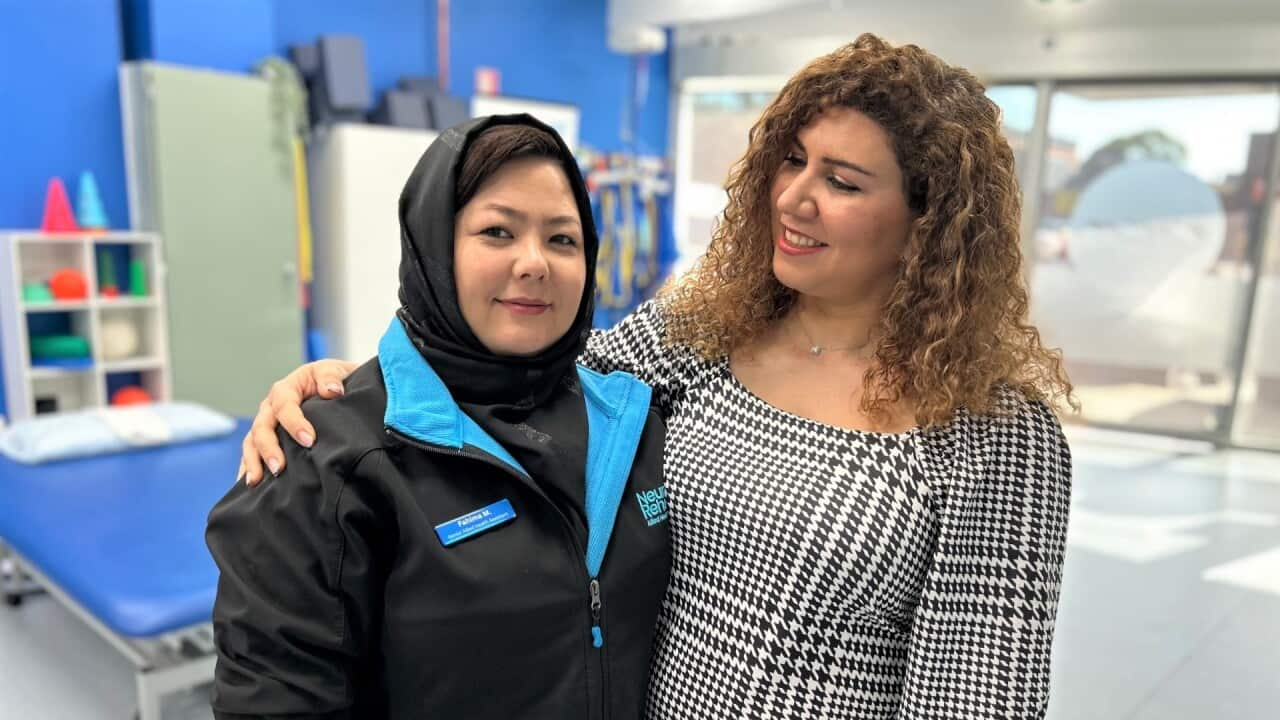A physiotherapy session is underway at a private clinic in Melbourne’s west.
Assisting the therapist is Fahima Mohammadi, who arrived recently from Afghanistan, where she was banned from working in her chosen field.
"In Kabul, the situation for Afghan women is very strict, and young women especially do not have permission to go out and work," she says.
Despite holding a diploma in physiotherapy and with five years' clinical experience, Fahima was prevented from practising physiotherapy under the Taliban's strict rules.

Fahima Mohammadi (left) with client Mary Callej. Source: SBS / Scott Cardwell
"If I help a client overcome limitation and they recover, many come back to me and say, 'Thank you, now we can do our jobs'. And that is very exciting for me," she says.
Like millions of women in Afghanistan's capital Kabul, Fahima’s life changed when the Taliban regained control on 15 August 2021.
"That day, I was at work and when I heard that the Taliban returned, I felt it was the end of my career and all my efforts," she says.

Fahima Mohammadi living in Afghanistan. Source: Supplied / Fahima Mohammadi
Fahima began searching for a way out.
She applied for multiple jobs online until she finally connected with Talent Beyond Boundaries (TBB) — a global not-for-profit organisation that connects skilled refugees with employers.
"I registered to their talent catalogue and they responded to me that I was selected as a candidate. And I felt very happy because it was the first response for me, and at that time I felt very low," she says.
The United Nations reports that are living forcibly and projects the total including stateless persons, returnees and refugees will rise past 130 million this year.
Around half of those are trained and of working age, according to Louna Ghawi, TBB co-director for Australia and New Zealand.

Louna Ghawi, Talent Beyond Boundaries' co-director for Australia and New Zealand. Source: SBS / Scott Cardwell
"Refugees are basically an untapped pool of talent. So, we built what we call a talent catalogue. Basically, it's a bit like LinkedIn for refugees.
"Now, any refugee around the world can access this database and upload their CVs, put some information about their experience," she says.

Fahima Mohammadi in Afghanistan. Source: Supplied / Fahima Mohammadi
As well as receiving support from the Australian government, Ghawi says other governments worldwide are getting on board.
"TBB has set up programs in Canada, the UK and several European countries, including Ireland and Belgium. And we are expanding to the USA and hopefully soon New Zealand," she says.
"Our aim is to build programs in 27 countries by 2027, to enable more refugees to access skilled migration."
The scheme also depends on the support of local employers. In Fahima Mohmmadi’s case, that person is Steve Woollard, the CEO of NeuroRehab Allied Health Network.
"We work in the disability space, providing services for people with a neurological disability and recruiting into this space can be a difficult process. In fact, there has been a shortage of allied health staff for a long time," Woollard says.
"But I am filled with pride when I think about this initiative, which links right down to our core purpose as an organisation, which is to empower people to live [a] life of choice, inclusion and new possibilities.
"And I really feel that's what we've really provided Fahima ... what she could do in Afghanistan after the Taliban returned was really restricted.
"So, by bringing her here, we hope to open up a lot of new possibilities. And our whole team feels the same, we're very proud to support Fahima in this way."
There are costs related to bringing a foreign worker to Australia — both finalising visas and completing legal paperwork. So, TBB says an ongoing commitment from local employers is crucial.
"We are lucky to have employers championing the cause and Steve is a real champion," Ghawi says.
"He looked not only to fill a skills shortage but also to help a woman at risk. She was trapped in a situation despite being highly skilled.
"We hope to find a lot more people like Steve because this is how we scale up. We need the private sector to come together and learn from Steve's experience."

Fahima Mohammadi holding a passport in Afghanistan. Source: Supplied / Fahima Mohammadi
"As a young woman, I did not have permission to travel alone, and I was so afraid that the Taliban would cancel my visa. It was very challenging for me, and I was nervous," she says.
In a carefully planned manoeuvre, Fahima flew to Iran with relatives before finally boarding a flight to Australia on her own.
But even now, Woollard says her trials are far from over.

Fahima behind the wheel in Afghanistan. Source: Supplied / Fahima Mohammadi
"However, when she gets an [Australian] licence, she can move into a full role, and we are supporting her through this process."
Fahima is living in a serviced apartment while she finds more permanent accommodation.
She is proud to be working in her profession once more while acknowledging that there are new challenges ahead.

Fahima Mohammadi is proud to be working in Australia. Source: SBS / Scott Cardwell
"But I think about my family because they are still under limitations in Afghanistan.
"I hope one day I can bring my family here because we are very close to each other and it's very hard for me to live alone."












